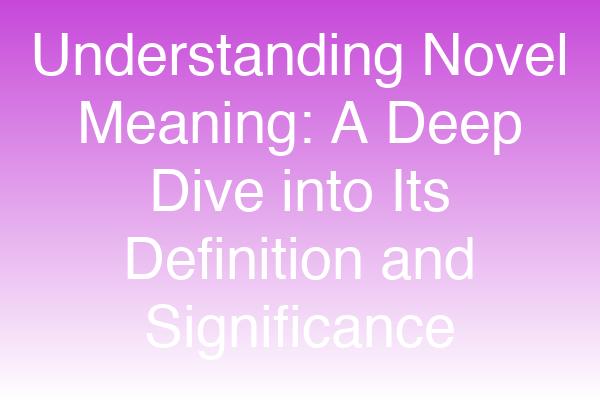
Categories: Literature, Language, Education
Tags: novel meaning, definition of novel, literary terms, novel examples, meaning of novel, literature analysis
Understanding Novel Meaning: A Deep Dive into Its Definition and Significance
Introduction
The term "novel" often evokes images of thick books filled with intricate plots and memorable characters. However, the novel meaning extends beyond just literature; it encompasses various interpretations and applications in different contexts. In this article, we will explore the multifaceted meaning of "novel," its significance in literature, and how it applies in everyday language. Whether you're a student, a literature enthusiast, or simply curious about the term, this comprehensive guide will provide you with valuable insights.
What Does "Novel" Mean?
At its core, the word "novel" can be defined in two primary contexts:
Literary Definition: In literature, a novel is a long narrative work that tells a fictional story. It typically features complex characters, a structured plot, and explores themes that resonate with readers.
General Definition: Outside of literature, "novel" is an adjective that means new, original, or unusual. It describes something that has not been seen or experienced before.
The Literary Novel: A Closer Look
Characteristics of a Novel
To better understand the novel meaning in literature, let's examine its key characteristics:
| Characteristic | Description |
|---|---|
| Length | Novels are typically longer than short stories, often exceeding 40,000 words. |
| Structure | They usually have a clear beginning, middle, and end, with a well-defined plot arc. |
| Character Development | Novels allow for in-depth exploration of characters, their motivations, and growth. |
| Themes | They often explore complex themes such as love, conflict, identity, and society. |
Famous Examples of Novels
Here are a few iconic novels that have shaped literary history:
- "Pride and Prejudice" by Jane Austen: A classic romance that critiques social class and gender roles.
- "1984" by George Orwell: A dystopian novel that explores themes of surveillance and totalitarianism.
- "To Kill a Mockingbird" by Harper Lee: A profound commentary on racial injustice and moral growth.
The Non-Literary Novel Meaning
In everyday language, "novel" is often used to describe innovative ideas or concepts. For example:
- Novel Solutions: Refers to creative approaches to solving problems.
- Novel Technologies: Describes new advancements in technology that change how we live or work.
Examples of Novel Applications
- Business: Companies often seek novel strategies to stay competitive in the market.
- Science: Researchers strive for novel discoveries that can lead to breakthroughs in medicine.
Expert Insights on the Meaning of Novel
To deepen our understanding, we consulted literary experts:
"A novel is not just a story; it's a reflection of society, culture, and human experience." — Dr. Emily Carter, Literary Scholar
"The beauty of a novel lies in its ability to transport readers to different worlds, making the familiar feel unfamiliar." — Prof. John Smith, Author and Critic
Why Understanding Novel Meaning Matters
Understanding the novel meaning is crucial for several reasons:
- Literary Appreciation: It enhances your ability to analyze and appreciate literature.
- Communication: Knowing the different contexts of the word can improve your vocabulary and expression.
- Cultural Insight: Novels often reflect societal values and issues, providing insight into different cultures.
Conclusion
In summary, the novel meaning encompasses both a literary form and a broader concept of originality and innovation. By exploring its definitions, characteristics, and examples, we can appreciate the depth and significance of novels in our lives. Whether you're diving into a new book or discussing innovative ideas, understanding the meaning of "novel" enriches your perspective.
Call-to-Action
Are you ready to explore the world of novels? Pick up a classic or dive into a new release today! Share your favorite novels in the comments below!
Social Media Snippet: Discover the multifaceted meaning of "novel"! From literature to innovation, explore its significance in our latest blog post. #NovelMeaning #Literature
Suggested Internal Links:
Suggested External Links:
FAQs
1. What is the definition of a novel in literature? A novel is a long fictional narrative that explores complex characters and themes, typically structured with a beginning, middle, and end.
2. How does "novel" differ from "novella"? A novella is shorter than a novel, usually between 20,000 and 40,000 words, focusing on a single plot or theme.
3. Can "novel" refer to something other than literature? Yes, "novel" can describe something that is new, original, or innovative in various contexts, such as technology or business.
4. What are some famous novels to read? Some famous novels include "Pride and Prejudice," "1984," and "To Kill a Mockingbird."
5. Why is it important to understand the meaning of "novel"? Understanding the meaning of "novel" enhances literary appreciation, communication skills, and cultural insight.
This comprehensive blog post provides a detailed exploration of the term "novel," ensuring it is engaging, informative, and optimized for search engines.